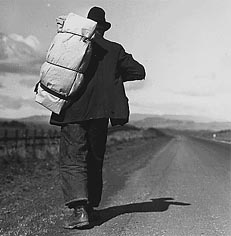 He was one of the mellow, the soft-spoken, the tawny-haired — one who preferred to be alone.
He was one of the mellow, the soft-spoken, the tawny-haired — one who preferred to be alone.
His name was Mark, a dishwasher at age 45.
He was a drifter, a loner. He valued his freedom above all; dishwashing jobs he could always find.
Our paths crossed and re-crossed at the Café Claire, where I was tending bar. The Café Claire stood on the outskirts of an industrial town, near the railroad tracks, beside his temporary home. Sometimes he’d sit at the end of the bar, before his shift or after, and drink black coffee. Sometimes he’d speak to me, and sometimes he would not.
He was a tidy man, and orderly. He organized things in an oddly geometrical way. He did not drink, he did not smoke, he did not use drugs. He was clean-living and in good shape, neither depressed nor its opposite.
He was single, without children.
And he was free.
He read a lot — novels and non-fiction — to endure, perhaps, the knives of lust that so frequently strike. He had the quietude of one who has gone a long time without sex.
His home was an efficiency apartment — a “hutch,” he called it — with good plumbing. (This mattered to him.) He dealt only in cash and he was good with his money. He saved, he moved on. Sometimes he worked on farms, sometimes he loaded and unloaded freight, sometimes he carried hod. But when I first met him and asked him what he did, he said “I’m a sudsbuster.”
So in the way of things, he would come behind my bar at times, when I was busy, and, without asking me, he’d wash my dishes. I loved him for that. He was fast on his feet and knew how to work around people, so that nobody was in anybody’s way. Buried in bloody marys and martinis, I’d glance over and see him plunged to his elbows in suds, his gold-rim spectacles, which somehow endeared him to me, filled with the burning bar light, his neat goatee damp with perspiration and pied with skeins of gray. Working with somebody in this way creates a deep and ineradicable bond.
Two or three times, I saw him outside work while I was in my car. Each time, he was walking alone along the railroad tracks, at dusk like some solitary figure carved from the coming dark. This was a grizzled landscape, a prairie desert of Euclidian perfection, full of rings and radii, vast yet traversed by a single road: an isolate highway humming day or night with Mack truck tires. The wind ferried tumbleweeds across the lion’s pelt land. Deadwood everywhere stood silvery-gray, like the moon above, and invariably whenever I saw him, a feeling of melancholy came over me, a melancholy for him, I am not sure why.
This, though, is not about pity or pathos, and Mark was not a person to pitied.
This, rather, is about one man out of many millions making his way
in the land of the free,
the USA.

